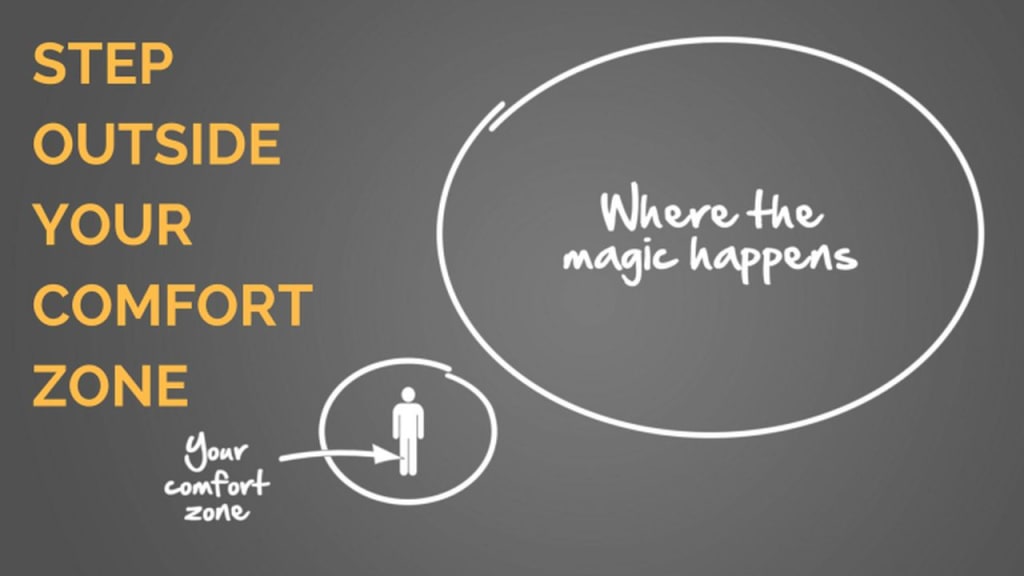You're Now Leaving... THE COMFORT ZONE!
Often, what can bring us the most success and gratification are those things that make us uncomfortable at first.

Whenever the words "comfort zone" pop up, someone invariably asks what it means. It's really quite simple: each of us has a way of doing things that's comfortable to us. From the time we get up (in fact, even the position we sleep in when we're catching the last of our 40 winks) to the time we hit the sack at night, we do and react to things in a manner that's almost automatic, because we're so used to them. In fact, the things that cause us the most trouble in life are those situations that sway us from our regular "feel-good" routines—our "comfort zones"; they don't feel right because we're not used to them.
But it's that very same "comfortability" that can hold us back from what we need to move ahead, whether it's to make a better income, a happier and more interesting life for ourselves or our families, or to alleviate depression.
So what's it like to leave the "comfort zone?" Imagine this: You're under the only streetlight on a very dark street, but you know that street will lead you to where you need to go. The light post has illuminated the sidewalk in a fairly wide circle around it, though beyond it, it's extremely dark.
Still, if you're going to your desired destination, you've got to get out from under that light; you can't stay there forever. Think you'll wait until someone comes along with a flashlight? That's co-dependence. How about just waiting until daylight? That's procrastination.
You see, you've got to find the courage to move out of the immediate, comfortable light and toward your goal. So you take a deep breath, swallow hard, and, shakily and slowly, you begin to step out from that comfortable light.
Now, let's stop here for a moment and review: The wide circle of light under the light post is our comfort zone. We can move around, leaning back on the post if necessary. We know where we are. The rest of the world looks dark and uncertain. But the longer we stay under that light, the more time we spend away from our goal. So, gathering our courage, we step away from the post, toward the outer rim of the light, and then—into the dark.
But (getting back to the lamp post for a minute) once you get a few steps into the darkness, guess what happens?
You find it's not as dark as you thought it'd be! Your eyes start to adjust to the lack of light. As such, you're able to see things around you: smaller, dimmer lights of buildings, street signs that direct you (if they're pointing in the right direction, follow them!), and other scenery. Of course, as you walk, it starts to get lighter because your eyes have become fully adjusted (and you begin to see there are other lights out there—just not as bright as the lamp post). You begin to have more confidence as you realize "Hey... I can do this!"
In everyday life, we sometimes find ourselves caught under a figurative "lamp post"—we feel comfortable with where we are and what we do. Like the circle of light around the post, we only work within the circle to which we've become accustomed. That means. inevitably, we're going to eventually repeat where we've stepped (what we've done or where we've been) before. We'll be "going around in circles" and never get to where we really need to go.
So we have to step out, in faith. In other words, we've got to believe that our changes will bring about the relief and answers we need. It's going to be a little tricky at first; that "comfort zone" has been so much a part of us that it's going to make us want to resist any change. But once we get into that uncomfortable area beyond that lamp post—the area beyond our "comfort zone"—we soon begin to realize that it's not as bad as it looks; there are other things out there to illuminate our way. And, of course, if we abide by the direction we're given, we'll get to our destination safely and securely—that of mental and emotional wellness.
Okay... we've talked a lot about it; now, how do we get out of our individual comfort zones? First, we've got to determine what we need to do to affect a desired result. When that's accomplished, we match it against what we're doing today that keeps us from getting that result.
During this time, we keep in contact with our "support block" (incidentally, your local hospital/mental-health center may even have support groups you can join for free. And there are also some amazingly effective groups on Facebook and other internet programs). We then adjust what we do, back it up with input from our support group or block. We need to know where we want to go, then change whatever needs to be changed (whether it's our way of thinking, our routine, or whatever) to get there.
Then... we step out. That's where keeping a "journal" or "diary" comes in. A little table-top journalism never hurt anybody: We can keep a day-to-day diary of what we're doing... it acts as both a reminder for us to follow our regimen and as a "journal of improvement," as such. Eventually, once we've fully left the dreariness of depression, we can refer to it and gauge our improvement. We'll also be in a position to help others if necessary because we've "been there, done that!"
While we're in the mood for writing, let's cover something else, okay?: Whenever we're really feeling the effects of depression, we can write down exactly how we're feeling and why. Notice I said "exactly!" We don't want to mince words! And don't worry... it's all private: if we feel like ?*#%, then we write down, "I feel like ?*#%!" We just get it out onto paper, and use as many pages we need, and whatever size of lettering we want! Then, when we're done, we take the paper, wad it up, and throw it away immediately! Sometimes it helps the "venting" process if you make it dramatic:
Once, I took my writing (it was almost a book in size!), wadded it all up, placed it in one of those plastic bags you get at the supermarket, wrapped and taped it up, then took it outside to the big trashcans and slam-dunked that sucker with authority! While I did, I spoke out loud, "That's the last time you're gonna bother me, you (!$#%&!)!"
Man, it felt really good to do that!
So, with a little research into our given situation, a lot of determination to affect a desired change, a good network of support to fall back on or advise us in the event it's necessary, we can move ahead—away from the comfort of that stagnant "lamppost" into a much better situation, and a better life!
About the Creator
Chuck Hinson
Chuck Hinson is a freelance writer, entertainment publicist, blogger and record promoter.






Comments
There are no comments for this story
Be the first to respond and start the conversation.